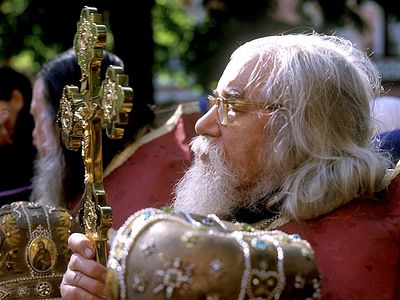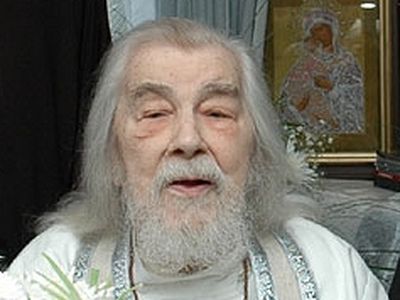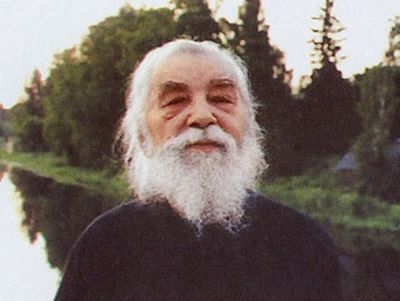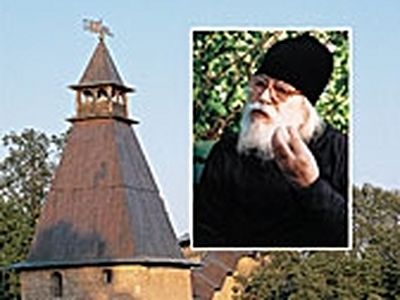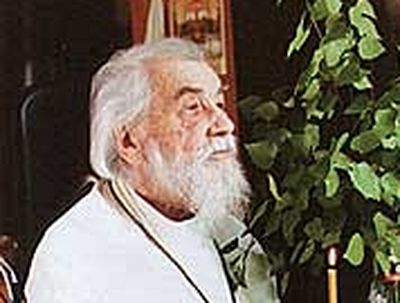On February 5, 2006, the elder known throughout Russia, Archimandrite John (Krestiankin), reposed in the Lord. That day in 2006 also happened to be the eve of the celebration of the Holy New Martyrs of Russia, and many saw the blessed elder’s repose as the culmination of an era of confessors for the Orthodox Faith in the much-suffering Russian land. Father John had been imprisoned and tortured for his steadfast confession of the faith, and even after his release lived a life under constant watch by the Soviet authorities. It was not a simple time, and great wisdom and spirituality were required to guide his spiritual children through this life. Fr. John goes down in people’s memory as having those gifts in abundance.
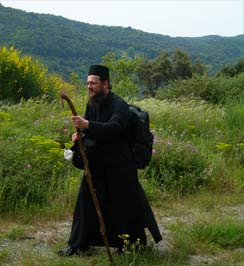 Igumen Savvaty (Rudakov)
Igumen Savvaty (Rudakov)
Fr. Savvaty was raised in a pious Orthodox family, and answered the call to become a priest. But his heart’s desire was to find a spiritual father, even though everyone would say that there are no elders like the ancients, who could lead a person through life. Fr. Savvaty prayed and hoped, and finally God led him to Fr. John in the Pskov Caves Monastery.
Writer Olga Rozhneva talks with Fr. Savvaty about his beloved spiritual father, Archimandrite John (Krestiankin).
* * *
“There he is!”
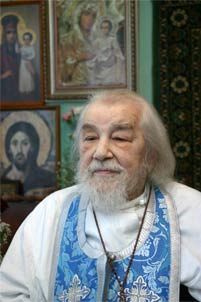 Archimandrite John (Krestiankin)
Archimandrite John (Krestiankin)
Fr. Savvaty remembers his first meeting with his future spiritual father as clearly as if it had happened only yesterday. But it actually happened rather long ago, in 1988. Fr. John was 78 at the time. The young priest came to the Pskov Caves monastery and arrived at the services in the largest church there—St. Michael’s cathedral. Before the services began, he as a priest was invited into the altar.
He waited in fear and trembling to meet the elder. A young priest was standing next to him, who had also come there for the first time. He had at least seen Fr. John before, but Fr. Savvaty hadn’t even the faintest idea of what the elder looked like. There were no photographs in those days, and Orthodox journals or newspapers were few and far between.
Then the side door to the altar opened and an elderly hieromonk entered. Or was he an Igumen? Fr. Savatty thought, “Maybe that is the elder? No, it’s probably not him…” Then another entered, a little older and completely gray. “Maybe him? Ho, not him…” More and more hieromonks enter the altar, but his heart was silent—no, I guess there is no elder here… Just then an elderly, gray-haired priest came in, and Fr. Savatty’s heart began to flutter, the feeling you get on a church feast day. “There he is!”
“I felt that I couldn’t be mistaken,” recalls Fr. Savatty. “The man who walked in was all luminous with an inner light! I quietly asked the deacon, “Is that Fr. John Krestiankin?” and the deacon answered, “Well of course it’s Fr. John Krestiankin! Don’t you know him?!”
But the young priest did not take offense at this criticism. The deacon was right—it’s impossible not to recognize Fr. John! He could not be confused with anyone else. And his heart told him, “There is my spiritual father!”
Simple words
The priest’s whole life turned around after meeting the elder. Fr. Savvatty came up to him and felt that he had no words, nothing to ask. He wanted just to stand next to him and feel the love radiating from this man. It was like a heavenly force coming from his soul. Fr. John poured out this heavenly love over everyone around him, and at first he couldn’t understand: How could Fr. John love everyone? Here is an evil man, there is a man with impure hands, while yet another is ashamed of himself for all the sins upon his soul. But the elder loved them all like a mother loves her sick children. This was Christ-like love.
Thus did Fr. Savatty stand next to the elder in silence. Then Fr. John asked him in a low voice, “And who are you?”
“I am a priest…”
“Are you a hieromonk or a married priest?”
“I am a celibate priest.”
“There is no such thing in the Russian tradition. Tell your bishop to tonsure you a monk.”
The elder appointed a time to meet with Fr. Savatty. The young priest prepared himself a long time for this meeting. He prepared himself to ask important—in his opinion—and complicated questions. But when the discussion began he felt he was a spiritual infant. Fr. John did not answer the questions Fr. Savvatty asked, as if he didn’t even hear them. He began with simple words, but these simple words were somehow extraordinary. A spiritual depth revealed itself with each word, and one could think and ponder over each one.
Igumen Savatty smiles, “I ask him about Harry and he tells me about Larry. Do you understand, he was a spiritual doctor. A spiritual professor. You complain to him about a spiritual illness like a pimple that popped up on your nose. But he has already penetrated your heart like an x-ray and seen the main reason for your spiritual illnesses. And your weaknesses. And your passions. As a doctor who sees what the patient doesn’t see. Fr. John spoke God’s truth, but he spoke it very softly, carefully. Like a loving mother feeds her children porridge—she blows on it, cools it down so that the infant does not get burned, that is how the elder fed his spiritual infants. Some shoot straight from the hip. But God’s truth is not always easy for an infant to digest… He never let his spiritual children go without treating them to some candy, some chocolates, and he loved us like children. He would often say, ‘My good ones!’
“But if Fr. John would see a deeply rooted vice or a destructive passion he would as if perform a spiritual operation—and pray for that person. You would return home feeling a slight pain—the elder was healing you, and opened a spiritual wound. So the incision hurts as it’s healing. He cauterized your spiritual ailment, but he did it so subtly and gently that you didn’t notice how the operation even took place.
“When I returned home from seeing the elder I felt I was a lucky man. I had found a spiritual father. And I was happy simply because he exists in the world. I felt his love and prayers from a distance, because he received me as one of his spiritual children and immediately began praying. He knew and remembered thousands of people by name.
“Fr. John was a window into the Kingdom of Heaven. I saw the Lord through him, because he reflected God in himself. Our soul is Adam, who has lost God. And it searches for Him and will not settle for anything else. Not power, nor riches, nor any kind of earthly delights can quench this longing for God or give peace to the soul. This was when I understood what the apostles must have felt when they were near to Christ! Or how they could exclaim only, “It is good for us to be here!” There were no other words, only happiness.
“Some time later, when I was already at home, one laborer in the monastery read somewhere that Fr. John had died. He told me about this. I felt like a little child who had lost both mother and father and I wept inconsolably. At that time it would have meant death for me to lose him.
“Then the laborer told me that he had made a mistake.”
A direction in life
“Fr. John gave his spiritual children the right direction in life,” Fr. Savvaty goes on, “he gave as if a ‘map’. And this is very important; after all, if you don’t know the way you can perish. But after that the elder instructed us to walk on our own legs. You can’t ‘sit’ on the elder.”
All of Fr. Savvaty’s life after meeting Fr. John and eighteen years until Fr. John’s death went on under the elder’s guidance. He received the monastic tonsure and became a hieromonk. Later at Fr. John’s blessing he founded a monastery. He became the builder, spiritual father, and head of the Kazan St. Triphon Convent, which is now [in 2010] fifteen years old.
Fr. Savvaty also remembers:
“I went to the elder when I had to decide some important life’s questions. Just like on a road, I had reached a fork and didn’t know which way to go. And the elder showed me the way. Once I asked him, ‘What will we do when we are left without you? To whom should we turn?’ Fr. John replied, “Have faith in God’s Providence.” Yes, this is now our path. The Lord took our spiritual Moses to Heaven, and now we have to walk by ourselves.
“The elder commanded us not to split from the Church. His spiritual testament was not in defense of the personal identification number, it was against schism. He said, ‘Fear division and schism in the Church! Fear falling away from the Mother-Church: it alone holds back the lava of antichristian debauchery in the world today!’ He loved and pitied people and understood that without the Mother-Church they will perish. And he took all the demons’ wrath that so desires to tear people away from the Church, from the Liturgy, from Communion. With humility he took the blow from others who criticized him for this.”
The demons took cruel revenge against the elder. Fr. Savvaty recalls one temptation:
“During his final years Fr. John was very ill; his age was showing, along with the difficult pastoral labors and trials in prison. In 1950 he was arrested for his pastoral service and sentenced to seven years in a labor camp. The interrogator Ivan Mikhailovich Zhukov, who interrogated the elder, stood out by his cruelty. Fr. John’s imprisonment left physical scars: the fingers of his left hand were all broken and they repaired haphazardly. But the emotional scars were even worse. Two months in the Lubyanka prison, two months in solitary confinement in Lefortovo prison, then a cell with criminals in Butyrka prison, a strict regime concentration camp, labor chopping trees, exceeding his strength, hunger… Fr. John did not like to recall the horrors of imprisonment; he only said laconically, ‘Well, in prison I had true prayer, and that is because every day I was on the brink of destruction’.
All his life, as well as in his final years, the elder rested very rarely. When his strength failed him completely he would travel to Estonia, to a quiet rural location, to one archpriest he knew. He would pray in solitude there. And on one of these days of a short rest, when the ailing elder was dozing, a high-ranking police officer came to him. He had brought an important chief along who was not accustomed to refusal or waiting. Pushing aside Fr. John’s cell attendant, this high-ranking officer walked unceremoniously into Fr. John’s room and started waking him up by slapping him on the shoulder. Fr. John later recalled that when he opened his eyes he saw the past: a prison camp all around, brutish guards, and perhaps even his interrogator. The elder went pale and lost his ability to speak. Running into the room the cell attendant waved her hands and shouted, ‘What are you doing? You’ll kill father!’ Fr. John was sick for a week after that. That was how the demons took revenge on the elder through people.
In the last years of his life the elder was raised to such spiritual heights that a certain feeling arose: He was only bodily on the earth, but his spirit was in the Heavens. Fr. Savvaty remembers one service on the Sunday of the Old Testament forefathers:
“At this service were commemorated all the Old Testament forefathers: Abraham and Isaac, Jacob and Joseph… Then we went out for the Litia. Fr. John was presiding at the service. When he commemorated all the Old Testament forefathers, naming them all by name, the feeling arose that he was saying it as though he was seeing them all. There they were, passing before him in a line. And he was crossing himself and bowing to each one of them, as they also blessed him. It was a little frightening and as if crowded in the church, as if the church was filling up with Old Testament fathers and they were right next to us.
“Perhaps that is how people felt who were present when St. Sergius of Radonezh and St. Stephen of Perm were bowing to each other at a distance of dozens of versts? Or those who were present at the services of St. John of Kronstadt who prayed with such boldness, as if he were standing before our Master and Lord and asking for His mercy?
“And I felt that Fr. John was already communicating in spirit with the forefathers. When I came to my cell I began to have doubts: perhaps I was just being silly? Maybe it’s prelest [spiritual delusion]? But when I talked with the other fathers of the monastery they assured me that they had experienced the same thing.
When Fr. John died in 2006 it was an enormous sorrow for all of his spiritual children. Fr. Savvaty remembers that when he boarded the train from the Leningrad station in Moscow it was full of people travelling to Fr. John’s funeral. Even the conductress was at a loss—all the cars were filled with bearded men wearing cassocks, and women in scarves and long skirts. It was a fraternal Orthodox train. Fr. Savvaty is thoughtful for a moment and then finishes his story:
“At the funeral, sorrow left and in its place came a quiet joy. Father had gone to God, and a part of our souls had gone with him. He is now even closer. I feel him in my heart. I feel his prayer. Father had many spiritual gifts: the gift of love, of prophecy, of bodily and spiritual healing, of words and instruction. He was a prayerful intercessor for the whole Russian land. I am sure that he will be canonized. Well, I can only attempt to share what I feel when I remember him: I have seen a holy man, and I am happy.

